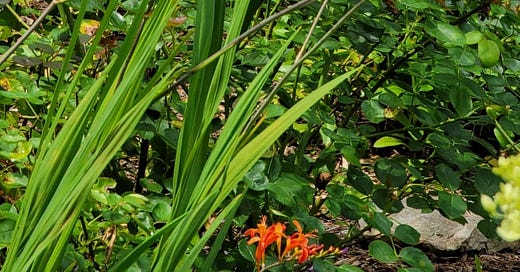The Psychology Of Transforming Real Life Into A Story
To this day, I grapple with recreating a childhood language, navigating between voice and voicelessness
Author’s garden
Mine is a story of displacement and loss. My transition to life in another country and culture was a difficult one. After immigrating to America from Israel, I forsaken the fluency of my native language to learn a new language. And in the process, I have cut myself off from my past, a language and a story I was born to. Goaded on by a fierce thirst for language and self-expression, I learned to look at my history as mine to construct and deconstruct.
During my sojourning into the narrative wilderness, I obsessed with words. I gathered and stored them away like a squirrel saving nuts for the winter. I needed to reinvent myself, and language became a survival mode, freedom from insignificance.
But choosing from the identity options available all around me took work.
My journey was nestled in the old world I came from. As I stood at the ship’s prow — watching the water tear away in diagonal, repeating, and receding lines — my explorations became a road to new frontiers instead of ancestral wisdom. I was introduced to a world whose social margins were fluid and uncharted. And yet, the country of my childhood continued to live within me with a primacy that was a form of love. It was, for me, self-preservation. I didn’t want my soul to shrivel from remaining in arid internal exile for the rest of my life.
To this day, I grapple with recreating a childhood language, navigating between voice and voicelessness.
My creation came in the form of the written word. Words on paper became the bridge between silence and speech — gushing onto the page what I couldn’t say out loud.
But my written voice still needs to be revised. It betrays me sometimes, playing only in flat registers. But I refuse to leave an image unworded. Sometimes, I even have to rewrite the past in order to go on with the future. And the Looking Glass through which I step into the past releases me back into the present.
In my first few years in my adoptive country, I learned new words every day, new expressions. I picked them up from conversations, from books, from television, from listening. There were words I took an irrational liking for their sound or just because I was pleased to have deduced their meaning — words like “enigmatic” or insolent” — words that had a literary value.
Space, like time, endangers forgetfulness.
It begs to tell of events that must be told and retold until their meaning is accepted. These memories come out broken like shards of glass — a chorus of voices in my head that grow louder and won’t be silenced. One horrible thought after another, as Hebrew became the language of the untranslatable past, and English helped to invent another me. It gave me a new written self. It existed in the abstract sphere of thoughts and observations than in the world. For a while, this impersonal self became the truest thing about me.
Memory is sacred ground. But it haunts me because it’s where my memories circle like hungry scavengers. I thought I was free. But loss is a magical additive. Time stopped at the point of dismissal, and no subsequent impressions muddied the picture I had in mind. The house, the country, the friends I had lost remain forever as I remember them.
Nostalgia crystallized around these images like amber. The past was made more beautiful by the medium in which it was held in my memory.
After a while, I couldn’t afford to look back, and I couldn’t figure out how to look forward. I was stuck, and time was stuck within me. And for a long time, I was confronted with self-division and deprivation. I feared not being heard because if not heard, I was not seen. I had the dizzying sensation that I was a quantum particle trying to locate myself within the swirls of atoms, wondering how much time and energy I’d have to spend just claiming an ordinary place for myself.
I suppose that’s why I fill every corner of my yard with plants and bushes. It leads me somewhere unexpected to somewhere intensely alive — and the result is independent of me. A life force of its own, a kind of osmosis, I absorb the beauty — an open door into a magical world of light and color.
It took years of higher education before I could take some control over the words that emerged from me. They are still accented, but I no longer have to form entire sentences before uttering them.
So what is the shape of my story, the story that is mine to tell? Perhaps it’s the avoidance of a single form that tells my tale. Sometimes, when I think of my past, the metamorphosis I have gone through strikes me as nothing short of a miracle. I was reared in the lowest depth of poverty. I am now living a comfortable life.
And yet when I look at my internal identity, it astounds me as being precisely the same as it was many years ago. After all, complete assimilation is impossible because no one knows what’s to be. Perhaps it’s my misfitting that fit. Perhaps it’s that observing consciousness that I remain, after all, an immigrant.



